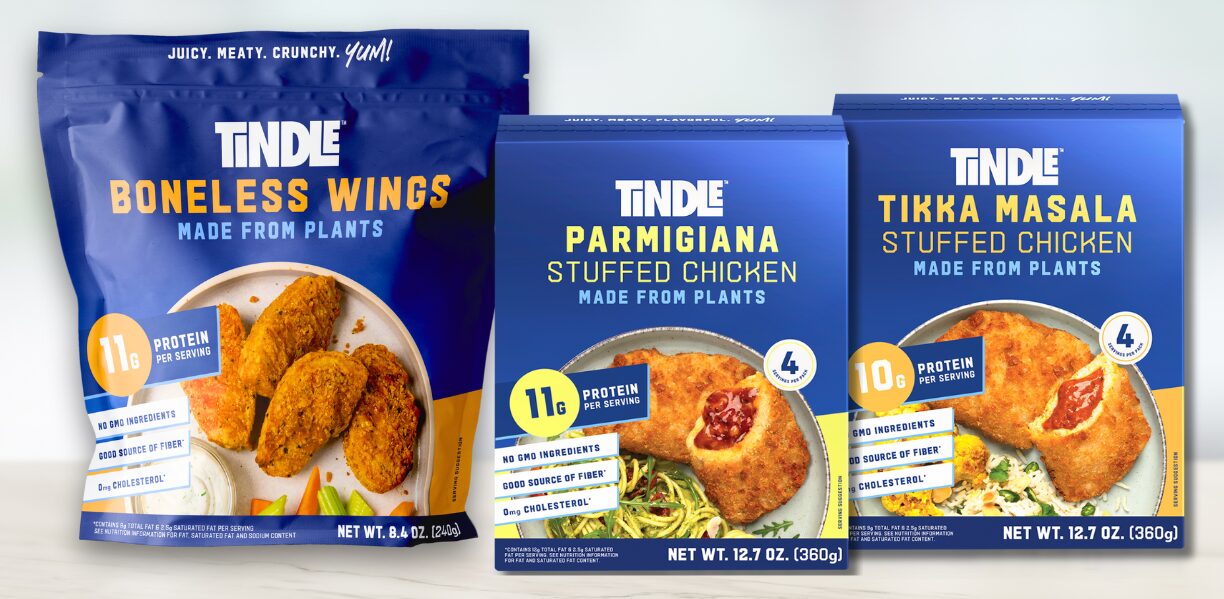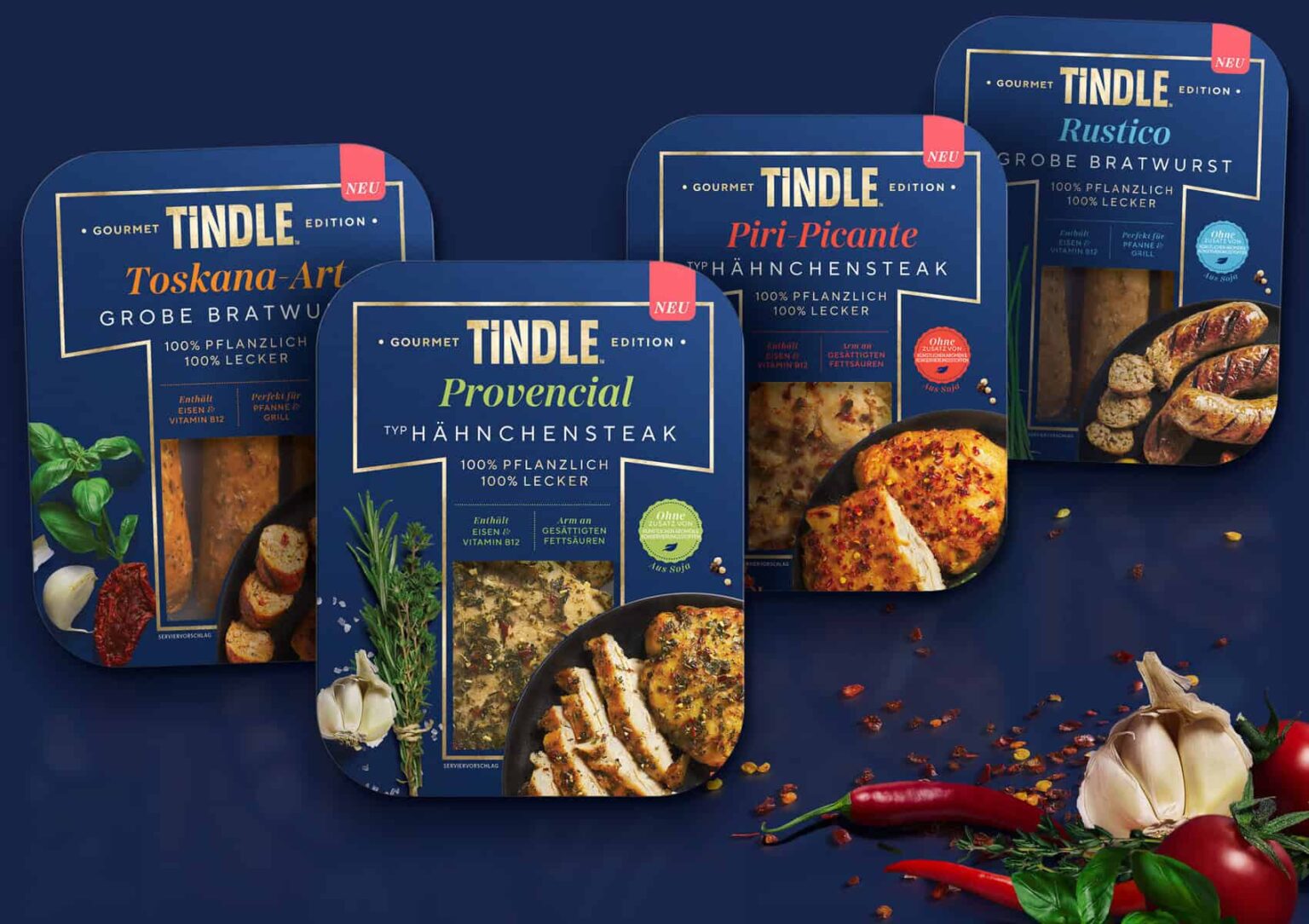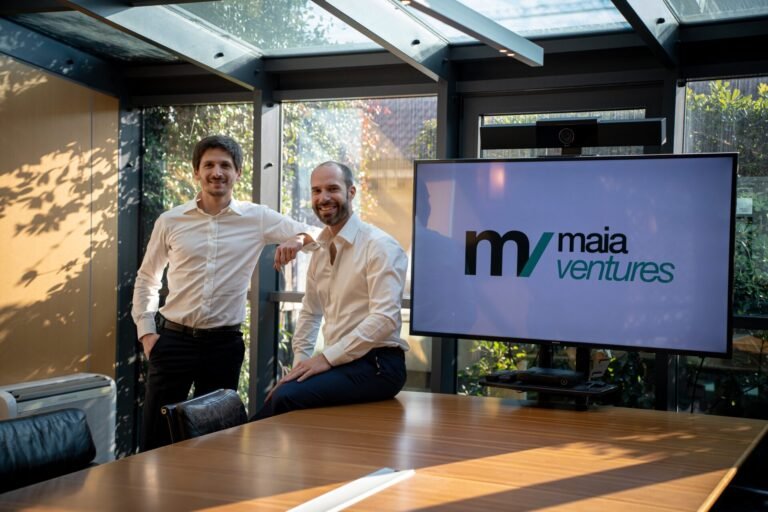
At a jaw-dropping $100 million, Next Gen Foods’ Series A—announced just weeks before agrifoodtech funding started its precipitous decline in early 2022—still stands as the largest A round in alt protein history. To make a return on this eye-watering sum, investors were banking on a hockey stick growth curve. What they got was something far more modest.
So where does the company (renamed as TiNDLE Foods in 2023)—and the broader plant-based meat segment—go from here?
Singapore-based TiNDLE—which sells plant-based chicken products in the US, Germany, Austria, Switzerland, and the UK—still has millions in the bank and a low burn rate, having made significant cuts to staff and operations in 2023 and 2024. It is also growing (unlike many plant-based meat brands) albeit not at the explosive rates anticipated in the heady days of 2020-22.
“If you do what Meati did [keep going until you run out of money], the investors lose everything,” one alt meat industry source who asked not to be named tells AgFunderNews. “If you do what Motif Foodworks did [close down with money still in the bank] investors might actually get something back. Or they could push for a sale.”
That said, the right move for TiNDLE’s investors is not obvious, he adds: “If you look back over the past year or two, there have been a lot of acquisitions for nothing, such as all stock-deals from one startup to another, but there hasn’t been any sale that made investors even whole, let alone making a return.”
And while there are pockets of growth in the plant-based meat segment, challenger brands such as Beyond Meat and Impossible Foods did not, in the end, have the kind of transformative impact many stakeholders anticipated at the height of the alt protein boom. Impossible founder Pat Brown’s infamous claim in 2021 that we’d see the end of animal agriculture by 2035—which even then appeared wildly optimistic—now seems almost delusional.
In the US, retail sales of plant-based meat fell 7% to $1.2 billion in 2024, with units down 11%, according to data from SPINS, while foodservice sales were down 5%.
In Europe, the picture is more nuanced, however, with alt meat sales over the same period down in the UK (-9.7%), Spain (-1.6%), and the Netherlands (-7%), but up in Germany (+3.9%), France (+15.5%), and Italy (+14.7%), according to the Good Food Institute.
‘Consolidation in this space is absolutely key’
Another industry source tells us: “Organic growth right now is frankly impossible. You spend a lot of money trying to grow something that grows so slowly, it doesn’t translate to shareholder value. So for me, consolidation in this space is absolutely key, and we’ve started to see that with Ahimsa Companies [which has acquired Simulate and Wicked Kitchen] and the VFC company [which has acquired Meatless Farm and Clive’s Purely Plants].”
The source adds: “For investors who came in at the peak of the valuation of the sector, chances are they’re going to have a haircut, for sure, if there is a deal. That said, I would expect the return for investors who came into a company like Next Gen Foods, which still has a solid balance sheet and good business fundamentals, would be potentially much better than any other [player in this space].”
The elephant in the room?
Andre Menezes, who co-founded Next Gen Foods in 2020 with Timo Recker in Singapore and stepped down as CEO in December 2023, is frank about the challenges facing the alt meat sector.
While everyone has a pet theory about what has gone wrong—meat analogs are too processed, too expensive, too different to meat or not different enough—there is a simpler, and more compelling explanation, he claims: most consumers are happy with meat.
And in the short term at least, this means that the market for alternatives is just not as big as people thought it was going to be in 2020.
“The fundamental issue is that there is no real underlying consumer demand to shift away from meat,” says Menezes. “So while we are all addressing a fundamental societal challenge coming from climate change and land scarcity, water scarcity… people just go and buy whatever they are used to.
“If the price is right for them and they like the product, they don’t care if they are destroying Earth in the next 30 years. Unfortunately, that’s just the reality.”
‘There is no real underlying consumer demand to shift away from meat’
He adds: “The other thing we missed in all of the reports and research, is that we tended to ask people, ‘What would it take for you to eat plant-based meat?’ What we should be asking is ‘What would it take for you to not have meat?’
“And here is the issue. Meat is probably the only food category that ranks extremely high in terms of health perception, in terms of being still affordable and in terms of being desirable… that most people are not really trying to reduce, unlike sugar or cigarettes.”
So what was happening in 2019/2020/2021, when alt meat sales were going up and investor enthusiasm was so high?
According to Menezes: “There was a lot of hype, a lot of curiosity about, can this really taste like meat? That’s super cool. Interesting. Let me try. But again, there was no strong underlying demand.”

TiNDLE CEO: ‘We have a very healthy cash position’
Timo Recker, who took over as CEO at TiNDLE when Menezes left at the end of 2023, is also under no illusions about current market dynamics, but says the company has been careful to preserve its runway and still has “more than 50%” of the Series A funds in the bank, so has a “very healthy cash position.”
He adds: “We reduced our burn rate by approximately 50% in 2023 and another 50% in 2024 so we work very efficiently with a positive and healthy gross margin. We have been growing organically, but obviously it’s not exponential growth. It’s incremental growth, which is in this market environment, is I think, good.
“There were really two hype cycles, one leading up to COVID, and then one during COVID, when people thought consumer habits were really changing,” he claims. Habits have changed, he says, but very slowly.
“I’d say now the hype is definitely over, but I’ve been doing this for 12 years [Recker founded plant-based meat co LikeMeat before Next Gen Foods], and I’m used to working in environments where there’s no hype.
“Now the category is slowing and consolidation is going on in the market. And of course, our board is looking at M&A as the big goal is to accelerate the adoption of more sustainable food, more plant-based food, and whatever can accelerate this journey. But I can’t comment confirm any rumors [about M&A].”

‘It’s low performers out, high performers in’
Right now, TiNDLE is focusing on the US and the Dach countries (Germany, Austria, Switzerland). It now supplies the UK, where it is mostly in foodservice, “as an export market,” after cutting its physical presence there as part of efforts to cut costs and reduce its burn rate, says Recker.
The firm, which has its HQ and R&D center in Singapore and works with co-manufacturers in the Netherlands and the US, is now in 1,300 stores in the US including several Kroger banners. It recently launched a private label line in Germany with Aldi and a clean-label branded gourmet line featuring chlorella algae with Edeka, the largest supermarket retailer in Germany.
As for retailers’ approaches towards meat alternatives, they vary by market, said Recker, who is now based in Munich. They are not necessarily reducing space devoted to the segment as sales growth flattens, he says, but rather reshuffling it to devote more space to stronger performers.
“It’s low performers out, high performers in. In the US, our best performers right now are our stuffed chicken products, which have really opened doors, because they are unique in the market. If you have a USP, the retailers are still willing to give you a chance. But the stuffed products don’t work in Germany, where we have a different product set which works. The flavors that work are also different, so the US likes things more spicy, for example. But we have a global design and global branding, which works really well.”
For the new gourmet line, which is “positioned as more of a better-for-you line, we’ve also gone for a more natural look, so we’ve toned down our blue color slightly,” says Recker. “It’s working well in Germany and we are looking to expand it internationally. But it will be step by step.”
‘It comes down to quality and price’
As for the addressable market, Recker remains confident that demand for sustainable proteins will increase over time.
“Meat will be around for a long time, especially when times are tough with labor and energy costs as it’s still cheaper and more available [than alternatives]. And if you look at quality and price, it has still an advantage [over plant-based alternatives].
“When the economy is shrinking, people are not looking so much at green energy and sustainable proteins, so progress definitely is more challenging in this environment. But in Germany alone, the plant-based market is roughly $1 billion, and the meat market is $44 billion. So if we can reach 10% of that market in the next five to 10 years, that’s still a great story.”
He adds: “But it ultimately comes down to quality and price. If you have the best quality for the best price, you will grow, and I think we don’t have that yet as an industry. The quality has to be better and we’re still 50% more expensive.”
The plant-based dairy side of the business—which the company started to explore in early 2023 after acquiring UK-based alt-dairy startup Mwah! and highlighted last year at Expo West via an oat-based barista milk—is on the backburner right now, he says.
“You have to pick your battles. In this environment we have to focus and right now we’re focused on plant-based chicken and on the TiNDLE brand.”
‘Valuations are down for everyone’
So what’s the path forward for TiNDLE?
According to Recker: “Right now it’s a time to double down, stay in the market and go long. We need to get sustainable proteins out there, and this will come, but it’s definitely a tough time for the industry. Valuations are down for everyone. So now is the time to buy and get into the market.
“We have been very responsible with our funds and very quick in reacting to the market changes, and that enables us, right now to be in a really good position and to take advantage of market opportunities.”
He adds: “I think the longer you go, the higher the chances are that you see a return. And there are always opportunities out there. We have a healthy, growing business with healthy cash position and if there is a great opportunity, we’d definitely look at it.”
Further reading:
🎥 Synthesis Capital: ‘We avoided the plant-based CPG blood bath’
Heura bags $22.2m from EIB to expand plant-based tech platform, aims for profitability in Q4
Rival Foods raises $11.6m Series B to scale shear cell tech for plant-based whole cuts
The post From record Series A to market reset: Where TiNDLE Foods—and plant-based meat—go next appeared first on AgFunderNews.




